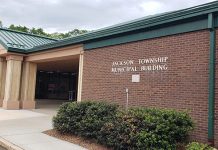
JACKSON – An ordinance that would provide regulations concerning houses of worship has been indefinitely tabled but it is expected to return to a future agenda according to Council President Martin Flemming.
Two residents posed questions about the ordinance during a recent Township Council meeting. Ordinance 14-23 entitled, “Churches and Places of Worship” was not heard during an April 13 council meeting due to a notice requirement and its second reading had to be properly advertised and it did not appear on the April 25 meeting agenda.
Flemming previously explained that the ordinance was the result of a settlement agreement following litigation on the federal level. “It is part of our legal settlement to allow for places of worship with standards in all the different zoning areas that we have in town.”
In the last several years residents have been critical toward township code enforcement measures and have given an earful to members of Council regarding complaints of homes in residentially zoned areas that were being used as houses of worship or “prayer homes.”
Such homes were noted to have received violation notices for not having received the proper permits for construction to modify the residence for prayer house use. Residents also complained that they experienced noise and weekend parking issues within those neighborhoods.
Reaction to its initial introduction ranged from numerous members of the township’s Orthodox Jewish community voicing their strong support of it to some residents asking what the ordinance would mean.
Township Attorney Gregory McGuckin stated this ordinance would regulate such uses.
“Ordinance 14-23 has been tabled indefinitely. It takes two readings to pass anything. It had its first reading. We are not going to give it a second reading at this time,” Flemming said during the April 25 council meeting.
“Tabled means we are not going to go further with the ordinance. It never had a public hearing,” he repeated to the question of another resident.
Township Attorney Gregory McGuckin told the resident there had been no change to the existing ordinance. “Whatever the ordinance provides for currently remains in place. The current zoning is not changing at this point.”
Resident Brain Herbsman “you said ordinance 14-23 is tabled at this time. If it becomes un-tabled it would have to be re-noticed?”
“Yes,” Flemming replied. No explanation was given as to why the ordinance had been tabled.
A resident of Four Seasons, a senior community located in the township said, “we are grateful for you tabling that.”
She added, “we are a retirement community and we are aware that schools are in the works to overpopulate our area and there would be traffic and noise pollution and unacceptable change to the property we thought we were buying and the retirees have no will or finances to pick up and move.”
Flemming prefaced that the ordinance was only tabled. “It will sit there but sometime in the future it will come back and you will be noticed.”
McGuckin noted previously that building standards had been included within the proposed ordinance such as bulk standards and design criteria for houses of worship. It includes text for primary frontage on a local road or a road of a higher order, as defined by the Residential Site Improvement Standards. Houses of worship shall not be located mid-block and shall be situated on a corner lot.
A number of residents came forward to express support of the ordinance when it was first introduced saying it “moved the township forward and set a different tone from a past Council meeting.”
Resident Raymond Cattonar expressed a different saying that by allowing houses of worship throughout Jackson they would be tax exempt “which could cost Jackson taxpayers millions of dollars in lost tax revenue.”
He noted the ordinance would also “add commercial parking lots and commercial buildings in any residential neighborhoods at the end of the blocks with no limitation to how many can be built. Homes on corners can be knocked down or additions can be added and the adjoining lot homes can be destroyed and made a commercial parking lot.”






